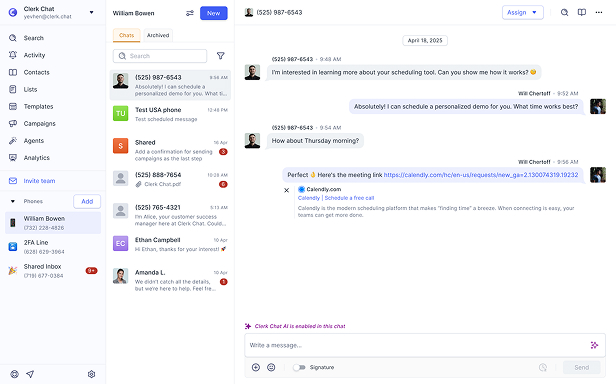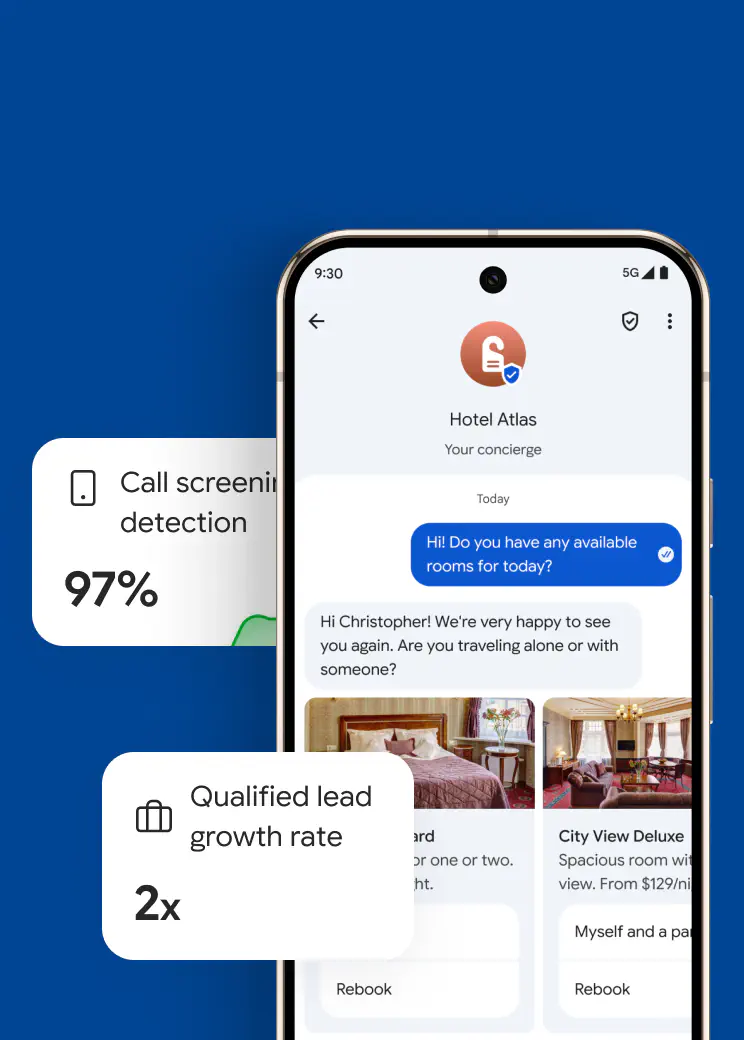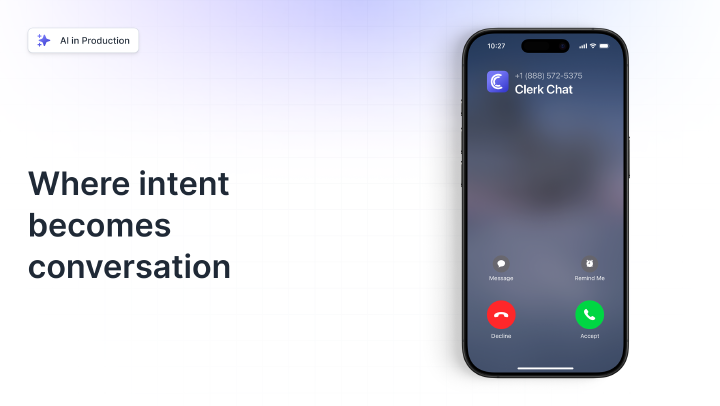RCS vs WhatsApp - What’s the Best Messaging Channel for Your Business?
By Igor Boshoer
- Published: April 9, 2025
RCS vs WhatsApp: which is better for your business?
On a broad scale, it’s safe to say that messaging has taken the world of communications by storm. About 23 billion texts are sent worldwide every day, and that doesn’t even account for the huge number of messages sent through social media tools (like Facebook Messenger).
Both RCS and WhatsApp introduce new opportunities to the consumer and business messaging landscapes. They both allow users to communicate with rich multi-media messages that can feature images, GIFs, sound clips, and more. They also both come with unique features, such as read receipts, typing indicators, and even solutions for text encryption.
But, while there are similarities between RCS messaging and WhatsApp messaging, there are some major differences to consider, too.
Here’s your guide to the key differences between RCS chat and WhatsApp and our top tips on how you can make the right choice for your business.
In this article:
RCS vs WhatsApp: Feature Comparison
Whether you’re comparing A2P messaging methods or P2P messaging solutions, both RCS and WhatsApp have their strengths and weaknesses. In the battle of RCS vs WhatsApp – both tools have some great features, from group chats to multimedia messaging and typing notifications.
Both are also excellent for businesses investing in 2-way text messaging for marketing, sales, and customer service. For companies, RCS and WhatsApp both allow for the creation of verified, branded business profiles, which help to add authenticity to campaigns.
They both offer rich media support and have an exceptionally high open and engagement rate. They also both support APIs for integrations with a range of other communication and business tools.


Here’s a quick RCS messaging vs WhatsApp feature comparison to help you.
| Feature | RCS | |
|---|---|---|
| Platform | Integrated into a native messaging app (Android or iOS 18 and above) | Standalone OTT app |
| Media support | Images, videos, GIFs, forms, buttons, and audio | Images, GIFs, videos, buttons, audio clips and more. |
| Group Messaging | Yes | Yes |
| End-to-end encryption | Possible – but dependent on carrier and implementation | Implemented by default |
| Read receipts and typing indicators | Yes | Yes |
| Business features | Limited (RBM – RCS Business Messaging) | Advanced (WhatsApp Business) |
| Reach | Global but dependent on carrier and device | Global but dependent on a user download |
| Interactive elements | Rich Media, suggested replies, and carousels | Rich media |
| Integrations | Supported | Supported |
Interactive Demo: Beyond Basic Business Texting
The Rise of Real-Time Messaging Solutions
How people communicate has changed a lot in the last few years. In the past, companies usually relied on call centers (for voice-based conversations), email, and standard business texting solutions (SMS) to connect with customers. All of these communication channels still serve an important purpose, but they’re limited in their advanced features and speed.
Now that customers are expecting more immediate, engaging, and personalized interactions with companies, we’re starting to see a growing demand for real-time messaging platforms. Solutions like RCS or iMessage and WhatsApp allow companies to connect with clients in unique ways.
They can send rich media to customers, such as images, gifs, video clips, forms, buttons, and audio. With WhatsApp and RCS, companies can also track customer interactions – monitoring read receipts and typing indicators.
Some real-time messaging solutions (like WhatsApp) even support integrations with AI tools for customer service, allowing companies to automate various conversations. Here’s a quick overview of RCS vs WhatsApp: what they are, and how they work.
Ready to choose the right messaging for your business? Clerk Chat offers RCS, WhatsApp, and more.
RCS Messaging vs WhatsApp: What is RCS?
RCS (Rich Communication Services) is a messaging format or protocol designed as an upgrade from standard SMS. When it comes to RCS messaging vs SMS, RCS uses internet connectivity (Wi-Fi or a cellular network) to send and receive messages, while SMS relies on cellular carriers.
RCS still operates within a native messaging app on a smartphone (unlike WhatsApp), but it offers many of the features of OTT (over-the-top) messaging apps, such as:
- Multimedia messaging: RCS can support images, GIFs, video clips, audio, and even a range of other types of interactive media like forms and buttons.
- Enhanced messaging features: With RCS, users get access to typing indicators, read receipts, and the ability to create longer messages without character limits.
- Verified business profiles: RCS allows companies to verify their sender profiles, adding a layer of trust to A2P messaging strategies.
- Branding and customization: When companies use RCS for marketing or sales purposes, they can add branded elements like logos, colors, and other components.
- Integration: RCS works natively within a phone’s standard messaging app, and doesn’t require users to download a separate service.
However, RCS is still limited in its reach and scale. Although more carriers and phone manufacturers now support RCS (including Apple), there are still people worldwide who can’t access this service. Plus, since it relies on an internet connection, people located in areas without a strong level of connectivity could be unable to receive RCS messages.
WhatsApp vs RCS: What is WhatsApp Chat?
WhatsApp isn’t a messaging protocol – it’s a communication application used for personal and professional messaging. In fact, it’s the world’s most popular “over the top” (OTT) messaging app, used by more than 3 billion people worldwide.
Like RCS, WhatsApp relies on an internet connection to send and receive messages. However, it needs to be downloaded onto a user’s device. Additionally, WhatsApp comes in a range of forms, from the standard messaging app typically used for personal communication to WhatsApp Business and the Business API for company-led conversational messaging campaigns.
Some of the key features of WhatsApp for business messaging include:
- End-to-end encryption: Unlike SMS in business communication or MMS, WhatsApp is a fully encrypted messaging channel. It protects message content at rest and in transit, making it a more secure option for highly regulated companies.
- Rich media support: Just like RCS, WhatsApp allows users to send images, videos, PDFs, and even locations through messages. Plus, WhatsApp supports voice and video calls too, as well as voice clip recording.
- Enhanced messaging features: Like RCS, WhatsApp supports typing indicators and read receipts. The business version also supports AI-powered messaging tools (customer service bots), and message scheduling capabilities.
- Integrations: Although WhatsApp doesn’t integrate with a standard messaging app on a phone, its open API can integrate with a wide range of other tools, like the Clerk Chat SMS platform, CRM, and archiving tools.
Unfortunately, WhatsApp still suffers from a few issues. For instance, it still requires users to have an internet connection – and it needs them to have an account with the app. Plus, while WhatsApp messages are encrypted, the company’s parent brand Meta does collect metadata about users, which can make it difficult for companies to comply with certain SMS compliance regulations.
Privacy and Security on WhatsApp and RCS
RCS chat vs WhatsApp: Which is better for security and compliance?
Standard messaging solutions for customer service teams, marketing staff, and sales experts suffer from a lot of compliance and security issues. Not only do you need to be aware of TCPA compliance guidelines and commit to understanding 10DLC, but SMS and MMS aren’t natively encrypted.
Both RCS and WhatsApp do offer encryption options. The main difference is that encryption on RCS varies, and can be dependent on carriers, devices, and implementation strategies. With WhatsApp, all messages are end-to-end encrypted as standard.
However, there are still privacy concerns with WhatsApp, due to the fact that Meta (WhatsApp’s parent company) can collect meta data from users.
User Perception and Reach
In the RCS vs WhatsApp debate, WhatsApp has a greater reach than RCS, with about 3 billion users compared to around 1 billion RCS users worldwide. Neither option has the same reach as SMS or MMS, however – as these messaging formats are available to virtually every phone user.
In terms of user perception, WhatsApp is often considered a safe, reliable, and convenient app, with plenty of great features to explore. RCS is still working its way up to being commonly accepted worldwide, thanks to limited carrier and vendor support. The fact that Apple didn’t support RCS for Apple devices until recently didn’t help either.
Cost and Accessibility
RCS costs vary depending on the types of messages you send and where you’re located. Fees are usually similar to sending an SMS or MMS message. WhatsApp is free for customers to use – although it needs to be downloaded onto a smartphone.
For businesses, WhatsApp can be a little more expensive depending on the features they need access to (such as conversational AI to enhance customer service), There are also costs to consider for using WhatsApp Business APIs to integrate the tool with your existing software.
RCS Chat vs WhatsApp: Business Use Cases
So, RCS chat vs WhatsApp – which offers the most business use cases? Ultimately, both solutions support similar use cases, ranging from transactional and alert-based text messaging to promotional messaging, customer service, and beyond. Some of the top use cases for both include:
1. Transactional Messaging
Both RCS and WhatsApp can be used to send transactional messages to customers. For instance, you can use these tools to alert customers when you receive an order or give them access to tracking data for a recent purchase. You can also use them to send one-time passwords for multi-factor authentication. However, WhatsApp is a little stronger in this area.
While RCS is great for sending OTP messages because the verified sender feature helps to ensure that customers know who the message comes from – it can lack the end-to-end encryption of WhatsApp. The comprehensive encryption in WhatsApp means that customers know any messages they get from you to gain access to an account are safe and secure.
Of course, strong SMS deliverability and reach also means that standard messaging services are great for sending transactional messages too. You can even use platforms like Clerk Chat to start automating SMS workflows for transactional messages.
2. Opt-In Campaigns
Ultimately, to ensure 10DLC and SMS compliance, and make sure you’re adhering to marketing regulations, you’ll need to ensure that you always receive “consent” from a customer before you start sending them promotional messages. That’s true whether you’re using SMS, RCS vsWhatsApp, or virtually any other channel.
For instance, you can invite customers to send a message to you via RCS or WhatsApp to opt-in to a marketing list. Alternatively, if a customer shares their contact details with you through a form or landing page on your website, you can use these tools to send confirmation messages.
Those messages can include buttons that allow customers to immediately confirm they want to “opt-in”. You can even send forms which allow customers to make requests, or adjustments to their “opt-in” requests – like asking to receive messages about specific products.
3. Promotional Messaging Campaigns
Although there are plenty of great tools and platforms that allow companies to take advantage of robust SMS marketing capabilities, like personalized templates and scheduling, both RCS and WhatsApp do allow companies to create more unique, engaging marketing campaigns.
In the WhatsApp vs RCS debate, both have amazing average open rates (over 90%), and strong levels of engagement, but they’re great for infusing your marketing campaigns with rich media. You can share pictures and videos of products in your messages, or even invite customers to purchase a product by clicking a button included within a message.
Due to seamless integrations with other platforms, like communication apps, and CRM tools, you can even take advantage of advanced personalization strategies. With a platform like Clerk Chat, for instance, you can segment your audience based on their preferences, locations, and other factors, and send unique messages to each specific group.
4. Customer Service and Support
Just like SMS and MMS, RCS and WhatsApp are fantastic messaging solutions for customer service teams. They enable great two-way interactions with typing indicators and read receipts. They also allow customer service teams to share rich information with customers, like how-to videos, or images that can help them to resolve issues faster.
If you’re choosing between WhatsApp vs RCS for customer service, however, WhatsApp might have an edge again. RCS can be used alongside chatbots for companies that want to explore AI’s role in customer service. However, you’ll need to ensure you’re integrating your RCS solution with a messaging tool that offers its own AI capabilities, like Clerk Chat.
WhatsApp offers access to native conversational AI capabilities through Meta AI, as well as allowing companies to take advantage of their own AI solutions with API integrations.
How to Choose the Right Platform
Ultimately, both solutions have their benefits and can support a range of use cases, from marketing and sales-based messaging to transactional messages, and customer service. They both enable rich media communications, allow access to interactive features, and support integrations.
They also both support encryption – although at different levels. Ultimately, the right choice for you will depend on a few key factors:
- Customer preferences: WhatsApp has a broader reach than RCS at the moment, but demand for RCS is growing, particularly now that it’s supported on certain iOS devices. Ultimately, it’s up to you to find out which option your customers prefer.
- Feature needs: While both solutions have similar features, WhatsApp does offer access to native AI tools and slightly more advanced business features. It can also be a slightly more flexible option for companies that want to automate campaigns.
- Privacy and security requirements: Although encryption options are available with RCS, WhatsApp supports end-to-end encryption as standard. This means that it’s often considered the more secure option for companies that need to adhere to strict compliance standards.
- Budget: WhatsApp’s API access can be costly – but it can deliver a great return on investment when it comes to boosting customer engagement. RCS is more budget-friendly, but doesn’t have the same reach or security features.
Ready to choose the right messaging for your business? Clerk Chat offers RCS, WhatsApp, and more.
Choose the Best Business Messaging Strategy
RCS vs WhatsApp: Which is better?
That all depends on you. Both options give companies plenty of ways to improve customer engagement, upgrade marketing strategies, and even enhance customer service. However, they have their own unique strengths and limitations. WhatsApp offers great encryption, business features, and massive global reach, but RCS is more cost-effective, and doesn’t require an app download.
Notably both of these tools also lack the reach of SMS and MMS, and require an internet connection, which can be a problem for some global brands. The best way to make sure you can get the most out of your messaging strategy is to take a holistic approach.
Clerk Chat’s features allow companies to experiment with RCS, WhatsApp, and iMessage, as well as standard messaging formats like SMS and MMS. You can use Clerk Chat to create comprehensive, personalized marketing campaigns, and deliver customer service with intelligent AI tools.
Plus, Clerk Chat is excellent for integrating SMS with your CRM and other business tools, so you can combine various aspects of your business communication strategy.
Don’t force yourself to choose between RCS and WhatsApp. Use Clerk Chat, and open the door to a huge range of messaging solutions in one simple, intuitive, and innovative platform.
An innovator by nature, Igor is dedicated to translating the technical aspects of product development into actionable business strategies and sales growth. He thrives when building scalable infrastructures while leading global teams to success. In his free time he indulges in his passions for film, mathematics, and engineering. Find his tech expertise in films like The Wolf of Wall Street.
In this article:
- RCS vs WhatsApp: Feature Comparison
- Interactive Demo: Beyond Basic Business Texting
- The Rise of Real-Time Messaging Solutions
- RCS Messaging vs WhatsApp: What is RCS?
- WhatsApp vs RCS: What is WhatsApp Chat?
- RCS Chat vs WhatsApp: Business Use Cases
- How to Choose the Right Platform
- Choose the Best Business Messaging Strategy
Ready to use your business number for text messaging?
Thousands of businesses are already experiencing the power of conversational messaging through SMS. Join us. Free trial and paid tiers available.
Get Started#Subscribe
Get product updates in your inbox
Tutorials, features, and Clerk Chat news delivered straight to you.



